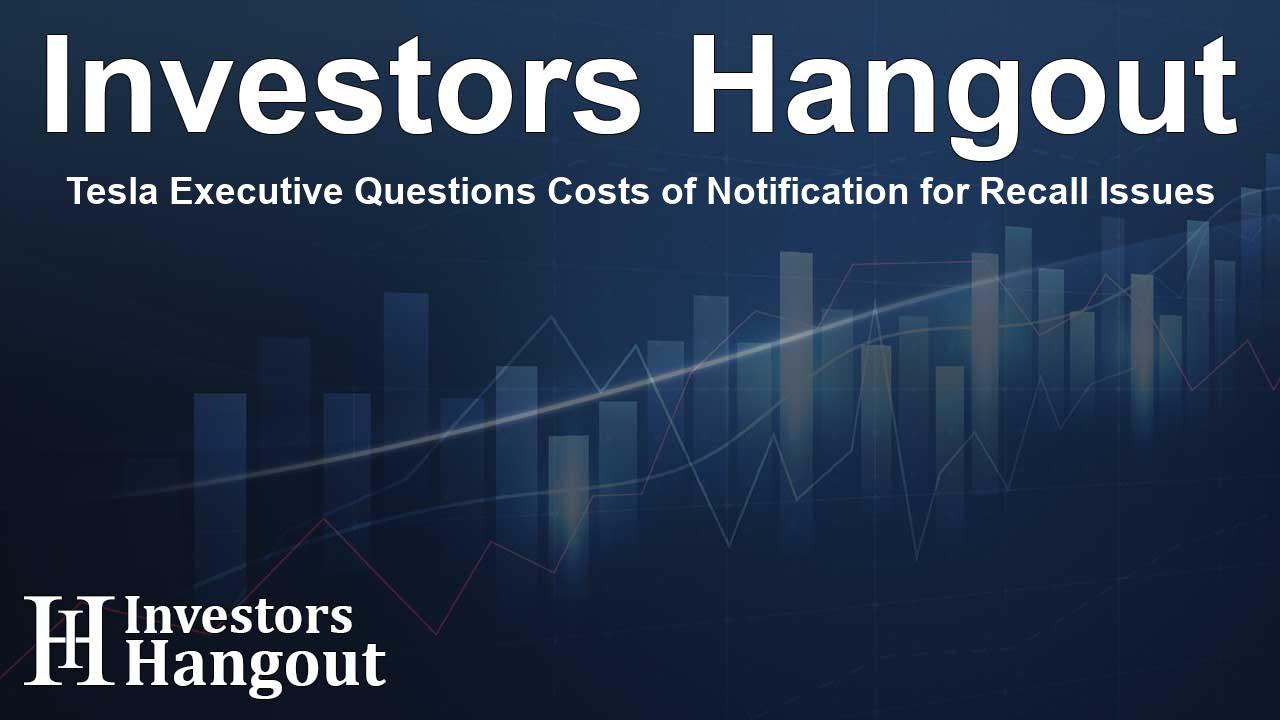Tesla Executive Questions Costs of Notification for Recall Issues

Tesla's Recent Vehicle Recall: A Costly Communication Challenge
Tesla Inc. (NASDAQ: TSLA) has recently encountered a significant challenge with the recall of nearly 700,000 vehicles, primarily affecting the popular Cybertruck, Model 3, and Model Y. A prominent executive at Tesla, Sendil Palani, Vice President of Finance, has openly expressed concerns regarding the financial burden associated with notifying vehicle owners affected by this recall.
The Challenge of Communication
Palani highlighted the economic implications of sending letters to customers whose vehicles require attention. He described the requirement to inform these owners as a potential waste of resources. The cost, notably increased to around $0.73 per letter, has made this a pressing issue within the company's current operations. Additionally, the overall administrative burden adds to this weighty concern.
Significance of the Recall
The recent recall, as mandated by the National Highway Traffic Safety Administration (NHTSA), was initiated due to issues relating to the tire pressure monitoring system in Tesla's vehicles. Though this might sound alarming, Tesla is leveraging its streamlined processes to address the problem efficiently. On releasing over-the-air software updates, Tesla aims to resolve numerous defects before vehicle owners even receive notification letters.
Rising Costs in Vehicle Safety Notifications
Palani estimated that the total expense for mailing out the recall notifications could reach as high as $506,000. It's essential to note that this estimate reflects only part of the financial ramifications of such mandatory communications. The complexity of managing customer relationships amidst these recalls adds another layer of difficulty for Tesla.
The Evolution of Recall Management
As demonstrated by Tesla's recent practices, the relationship between automotive recalls and vehicle owner notifications is evolving. Many of Tesla’s recalls are swiftly resolved through OTA updates. For example, earlier this year, the company recalled over 1.8 million vehicles due to a safety risk involving unlatched hoods. Remarkably, this massive recall was similarly addressed with an OTA update, showcasing the effective use of technology to mitigate risks.
Elon Musk's Stance on Recalls
Adding to this discourse, CEO Elon Musk has also been vocal about the challenges posed by traditional recall management. Earlier in the year, he advocated for a shift away from mailing physical letters to vehicle owners for issues that can be resolved via updates. Musk's appeal is indicative of the ongoing dialogue surrounding regulatory practices in the automotive industry.
The Debate Over Recalls
Musk and other Tesla officials have criticized the term 'recall' for issues that can be fixed remotely. They believe that the traditional definition does not accurately reflect the technological advancements now available in the automotive sector. Musk likened over-the-air updates to the frequent software updates received on smartphones, arguing for a modernization of vocabulary around vehicle management.
Looking Ahead for Tesla
As Tesla continues to grow and innovate within the vehicle market, the dialogue on effective communication and recall management will be critical. The challenge presented by associated costs should prompt further reflection and exploration of more efficient practices. Moreover, harmonious collaboration between governmental organizations and the automotive sector holds significant importance in addressing these evolving dynamics.
Investors and Consumers Join the Conversation
Both consumers and investors are increasingly engaged in conversations about how companies like Tesla manage recalls and customer communications. Public sentiment can influence perceptions of responsibility and transparency. With Tesla at the forefront of innovation, the company's methods of handling challenges can easily affect its reputation and stock performance.
Frequently Asked Questions
What is the reason for Tesla's recent vehicle recall?
The recall involves nearly 700,000 Cybertruck, Model 3, and Model Y vehicles over issues with the tire pressure monitoring system.
How much could the notification process cost Tesla?
Tesla's Vice President of Finance estimated that the costs for mailing recall notifications could soar to approximately $506,000.
How does Tesla address recalls quickly?
Tesla frequently utilizes over-the-air software updates to resolve identified issues before customers receive notice of the recall.
What is Elon Musk’s view on current recall processes?
Musk advocates for re-evaluating the traditional methods of recall notifications, suggesting that physical letters may no longer be necessary for issues solved via OTA updates.
What impact does communication cost have on Tesla?
The financial burden associated with notification letters poses challenges for Tesla in managing operational costs while ensuring safe vehicle ownership.
About The Author
Contact Hannah Lewis privately here. Or send an email with ATTN: Hannah Lewis as the subject to contact@investorshangout.com.
About Investors Hangout
Investors Hangout is a leading online stock forum for financial discussion and learning, offering a wide range of free tools and resources. It draws in traders of all levels, who exchange market knowledge, investigate trading tactics, and keep an eye on industry developments in real time. Featuring financial articles, stock message boards, quotes, charts, company profiles, and live news updates. Through cooperative learning and a wealth of informational resources, it helps users from novices creating their first portfolios to experts honing their techniques. Join Investors Hangout today: https://investorshangout.com/
The content of this article is based on factual, publicly available information and does not represent legal, financial, or investment advice. Investors Hangout does not offer financial advice, and the author is not a licensed financial advisor. Consult a qualified advisor before making any financial or investment decisions based on this article. This article should not be considered advice to purchase, sell, or hold any securities or other investments. If any of the material provided here is inaccurate, please contact us for corrections.
